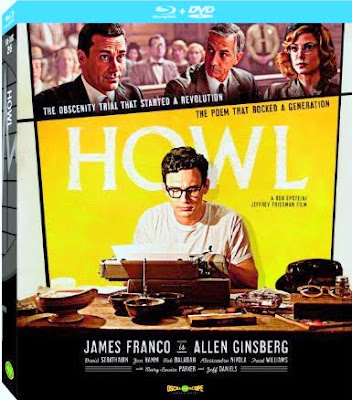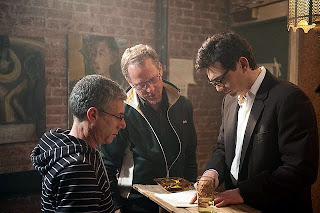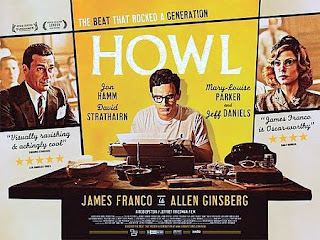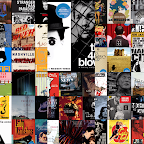In one of the twentieth century's most incendiary and infamous first amendment trials, San Francisco poet, publisher and City Lights book store owner Lawrence Ferlinghetti was threatened with imprisonment for daring to print and sell the purportedly “obscene” work Howl and Other Poems
Unlike the flowery odes to affairs of the heart found in your grandmother's classic poetry collection, Ginsberg's Howl
As shocking as it is sophisticated, Ginsberg's Howl
And much like a photo that develops and reveals more over time, Ginsberg (portrayed by James Franco) is the first to admit in an often quoted interview recreated in Rob Epstein and Jeffrey Friedman's fascinating film, that at times, even he doesn't realize exactly what he meant with certain turns of phrase until they come into focus years later.
Artistically, we discover that Ginsberg was inspired by Walt Whitman and William Carlos Williams as well as his handsome On the Road
Inspired by a man he met in a mental institution named Carl Solomon, which evoked subconscious feelings the writer hadn't faced surrounding his mother's battle with sanity and his own homosexuality, Ginsberg's sprawling epic of jazz phraseology is celebrated, artistically interpreted, occasionally analyzed and subtly deciphered in the filmmakers' daring cinematic opus.
Undoubtedly using the titular work as its cinematic muse, the 2010 Howl
Terrifically transferred to a breathtaking Blu-ray release, which turns the jazz staccato rhythms of Ginsberg's near paragraph length howling breaths of descriptions into a newfound contact high of high definition, Howl
The movie opens as it should, with the consummate chameleon James Franco nervously building up the courage to tell the audience that he's “seen the best minds of” his “generation destroyed by madness” as he launches into the work and the filmmakers move back-and-forth between the 1955 debut poetry and their animated interpretations of his famous stanzas.
Admittedly it's a bold approach and initially as jarring as watching the animators of Fantasia
But ultimately and with only a few notable exceptions here and there, this technique that's also reminiscent of Waking Life
In addition to highlighting the poem itself, most of the drama in the work is found in the filmmakers' recreated footage of the trial held two years after the reading along with an extensive interview that seems to take place simultaneously as Ginsberg recounts life before, during and after the writing of Howl in his apartment.
Passionate in its scope and subject, Howl is incredibly successful thanks to the impressive Franco and some scene-stealing speeches served up by Hamm and Bob Balaban in the courtroom sequences, which stirred up the same freedom fires that David Strathairn (who is also present) stoked in Good Night, and Good Luck
All in all, Howl
Text ©2011, Film Intuition, LLC; All Rights Reserved. http://www.filmintuition.com Unauthorized Reproduction or Publication Elsewhere is Strictly Prohibited and in violation of the Digital Millennium Copyright Act.
FTC Disclosure: Per standard professional practice, I received a review copy of this title in order to evaluate it for my readers, which had no impact whatsoever on whether or not it received a favorable or unfavorable critique.


















